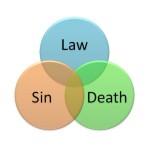Commenting on Romans 5:12 (some paragraph breaks added) –
Death is the supreme law of the world in which we live. Of death we know nothing except that it is denial and corruption, the destroyer and destruction, creatureliness and naturalness. Death is engraved inexorably and indelibly upon our life. It is the supreme tribulation in which we stand. In it the whole riddle of our existence is summarized and focused; and in its inevitability we are reminded of the wrath which hangs over the man of the world and the world of man.
So completely is death the supreme law of this world, that even that which, in this world, points to the overcoming and renewing of this world, takes the form of death. Morality appears only as the denial of the body by the spirit; the dying Socrates is the only fitting emblem of philosophy; progress is no more than a restless negation of the existing natural order. No flame – except the flame of the Lord! (Exod. iii. 2) – can burn without destroying. Even the Christ according to the flesh must die that He be appointed the Son of God (Rom. i. 3, 4).
We too must pass through death, if we are to render unto God the honour due to Him. We have to learn that the fear of the Lord is the beginning of wisdom. We would like to turn our backs on all this, if we could. We would like to protest against death in the name of life, if it were not that the protest of death against our life is far more venerable, far more significant. We try to bury out of sight the suspicions and reservations which accompany every unbroken affirmation we make, and to protect our eyes against the grey light of the final negation which is preceded by a whole host of preliminary negations. But we are unable to persist long in our attempt; for it is all too evident that the grey light does not proceed from our caprice, but has a primary origin. It envelops our whole life (Rom. i. 10), for there is no vital and creative human action which is not born in pain and revolution and death.
We are powerless; we are lost. Death is the supreme law of our life. We can say no more than that if there be salvation, it must be salvation from death; if there be a ‘Yes’, it must be such a ‘Yes’ as will dissolve this last and final ‘No’; if there be a way of escape, it must pass through this terrible barrier by which we are confronted.


